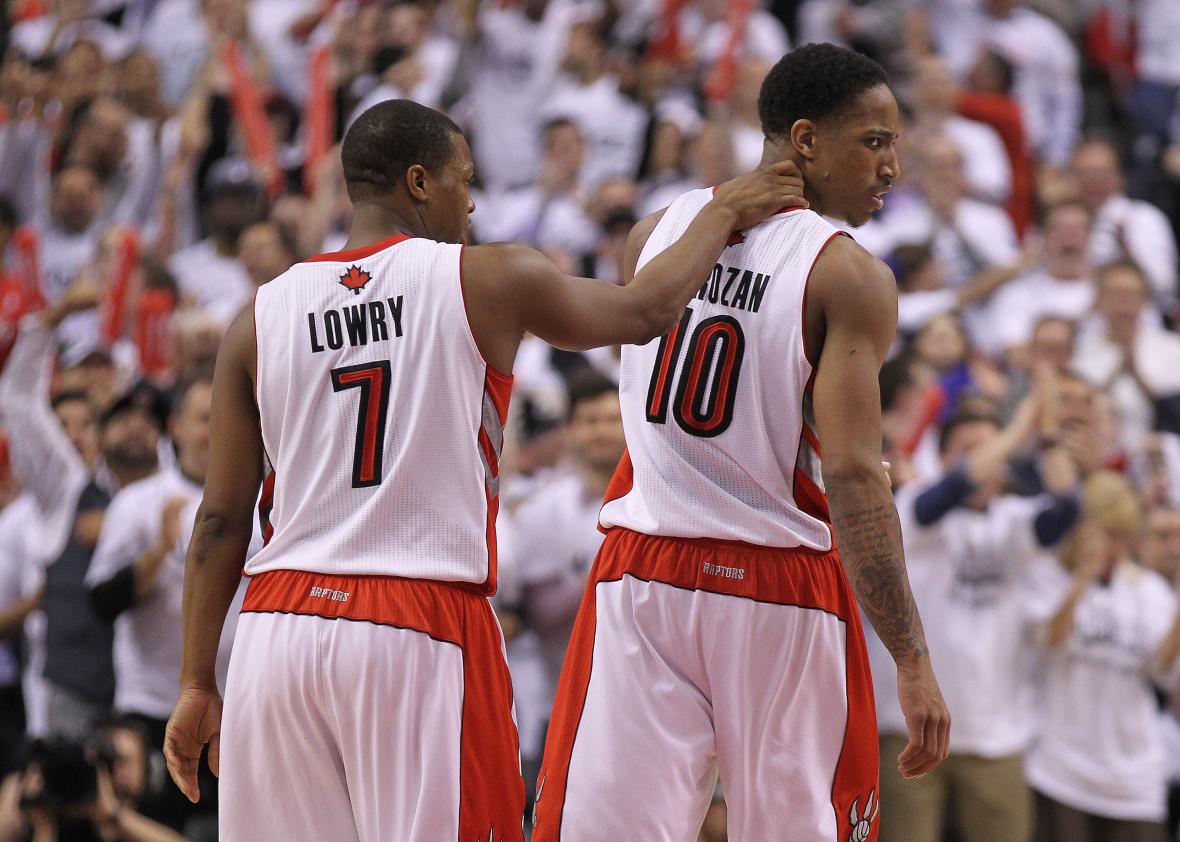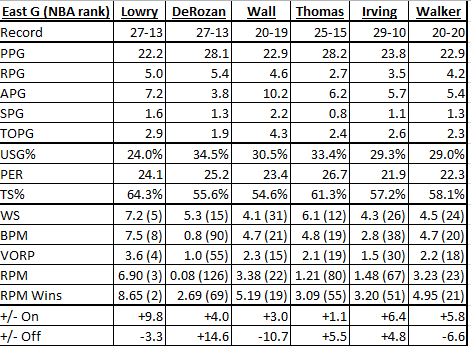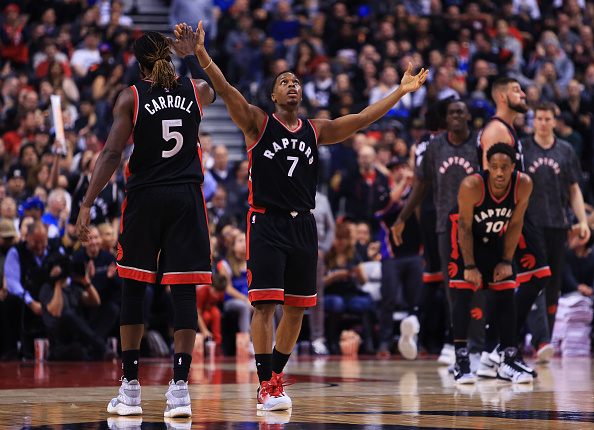Today is the final day for NBA fans, players, and select media to cast their votes for the starters in the 2017 All-Star Game. This is the last day to go to NBA.com/vote, it’s the last day to hammer #NBAVote on Twitter, it’s the last day to vote however it is you vote by Google search, and were the Toronto Raptors to play today, it would be the last chance to sneak 30 or 40 “HASHTAG NBA VOTE”s into your broadcast.
On the most recent returns, Raptors shooting guard DeMar DeRozan ranked third among Eastern Conference guards, while his point guard counterpart Kyle Lowry ranked fifth. Both are two-time All-Stars already, and both deserve to make their third game once again this season. It seemed unlikely, based on the last count, that they’d be able to push higher than second and fifth, respectively, but that’s not the end of the world for Lowry (or DeRozan if he doesn’t jump Dwyane Wade). The voting format changed this year so that fan voting only accounts for 50 percent of the vote, with media and players each having a 25-percent impact. So if Lowry ranks fifth among fans but first among media and players, he’d have a chance to get in.
At this point in the year and in their careers, I’m confident most are in agreement that the Raptors’ guards belong in the All-Star Game. I’ve kind of put off making the impassioned cry for their inclusion like I did the last two years for Lowry, because the feeling I’ve gotten is that most seem to appreciate them (and, you know, time constraints). The voting returns suggest otherwise, as do my twitter mentions from opposing fanbases any time I’ve used the hashtag (which, by the way, is a thing I feel weird about as a non-voting member of the media who also runs one of [if not the] league’s biggest fan sites – I hope I’ve navigated the awkward professionalism/objectivity line well enough, and in this case I feel comfortable knowing I really do believe both are deserving All-Stars). Anyway, they both deserve in, and here’s a quick refresher on why.
Actually, before we get into the case for each, I want to throw out a few caveats. For one, the East being guard-dominant has led me to use several wings as frontcourt players as I fill out a fake ballot. Jimmy Butler has spent the bulk of the year at small forward, anyway, but in years past he may have been slotted in as a guard with more rigid position buckets. Giannis Antetokounmpo, a wonderful, position-less basketball miracle who sometimes plays the one or two or five or a made-up position we don’t have a number for yet, is getting listed in the frontcourt. Bruno Caboclo, who posted a Defensive Rating of 0.0 in his appearance on Sunday, is going in as a frontcourt player.
Even shifting those guys all to the frontcourt, the East’s guard pecking order is a mess – I count six guards all deserving of inclusion on the team, and while I feel strongly about who belongs at No. 1, I would struggle to get too upset about people putting the six in whatever order feels right based on their own preferences. Lowry, DeRozan, Isaiah Thomas, John Wall, Kyrie Irving, and Kemba Walker have all turned in All-Star seasons so far, and depending on what you personally value in rating players.
Throwing all of their stats together in a table doesn’t create much separation.
(Legend: PPG – Points Per Game; RPG – Rebounds Per Game; APG – Assists Per Game, SPG – Steals Per Game, TOPG – Turnovers Per Game; USG% – % of team’s offensive possessions used when on the floor; PER – Player Efficiency Rating; TS% – True-Shooting Percentage, WS – Win Shares; BPM – Box Plus-Minus; VORP – Value Over Replacement Player; RPM – Real Plus-Minus, RPM Wins – Wins added based on RPM; +/- On – Team’s plus-minus [per-100 possessions] with player on the floor; +/- Off – Team’s plus-minus [per-100 possessions] with player off the floor)
What’s pretty clear from this table, though, is that Lowry is the cream of the crop. No, he doesn’t score at quite the same level of the others, and he doesn’t have the assist numbers of Wall. You might even qualify his mega-efficiency by pointing out he has the lowest usage here by a substantial margin. That’s fine, but even with the lower usage, he’s been lethal enough for his counting stats to rank close to his peers. He’s a better shooter than Wall and Walker, a better playmaker than Irving and Thomas, and a better defender than anyone in the group other than an engaged Wall.
Lowry’s impact, like in years past, really jumps out when you look at the catch-all advanced metrics, which at least go part of the way toward capturing defensive impact, and non-statistical impact. There is even some separation, with Lowry ranking as a top-five player in the entire NBA so far, while his point guard counterparts are clustered outside of the top 10 in most of these categories. These stats obviously aren’t mic drops of any sort, but they’re additional information that help back up the obvious qualitative impact of Lowry’s game – he’s the best player on the second best team in the conference, the Raptors go as he goes, and the on-off numbers are quite striking. He is the best point guard in the conference, and one of the conference’s best players overall.
That’s not to say DeRozan’s case isn’t strong, too. It is, but he’s hurt when you pull in some player valuation metrics, and particularly if you note that the Raptors have been even better with him on the floor. DeRozan’s case is an obvious one if you look at the box score stats – he’s fourth in the NBA in scoring, doing so at an efficient rate, and chipping in with strong rebounding and playmaking numbers for the shooting guard spot – but a more nuanced argument requires some team context to be brought in. While Thomas, Wall, and Walker are all so palpably important to the success of their teams, DeRozan’s detractors note his defense and his high usage as reasons his scoring load isn’t all that important.
The thing is: It is, especially given how the Raptors are built and designed. Lowry and DeRozan are inextricable from each other when discussing the team, and while Lowry’s bench-led groups perform better than DeRozan’s, the two spending as much time together as they do makes Lowry even better, freeing him up off the ball and to focus on the defensive end while DeRozan carries more on his shoulders. That defenses are consistently selling out to stop DeRozan or get the ball out of his hands and he’s still scoring at will, and doing so more efficiently than he ever has, is remarkable. Enough can’t be said about DeRozan’s consistent improvements to his ball-handling, his footwork, his jumper, and more. And while the metrics don’t necessarily agree, anecdotally, it seems like he’s been better on the defensive end as the season’s wore on.
There is, of course, no real need to put Lowry ahead of DeRozan (or, if you feel differently, the opposite). The only reason it comes up is that in making the case for both, it’s clear Lowry’s is just a little stronger. They are both immensely important to what the Raptors do, and the Raptors are very good as a result of their on-court relationship. Both players deserve to make their third All-Star Game. And they probably will. But you can help them out just a little bit more by using today to get those final #NBAVote tweets in.
Anyway, here’s my full fake ballot (it’s a little different than on the podcast from Friday, but mostly the same):
Eastern Conference
G – Kyle Lowry
G – John Wall
F – LeBron James
F – Jimmy Butler
F – Giannis Antetokounmpo
—
G – Isaiah Thomas
G – DeMar DeRozan
F – Paul Millsap
F – Kevin Love
F – Joel Embiid
WC – Kemba Walker
WC – Kyrie Irving
Western Conference
G – James Harden
G – Russell Westbrook
F – Kevin Durant
F – Kawhi Leonard
F – Marc Gasol
—
G – Steph Curry
G – Chris Paul
F – DeMarcus Cousins
F – Anthony Davis
F – Draymond Green
WC – Rudy Gobert
WC – Gordon Hayward




